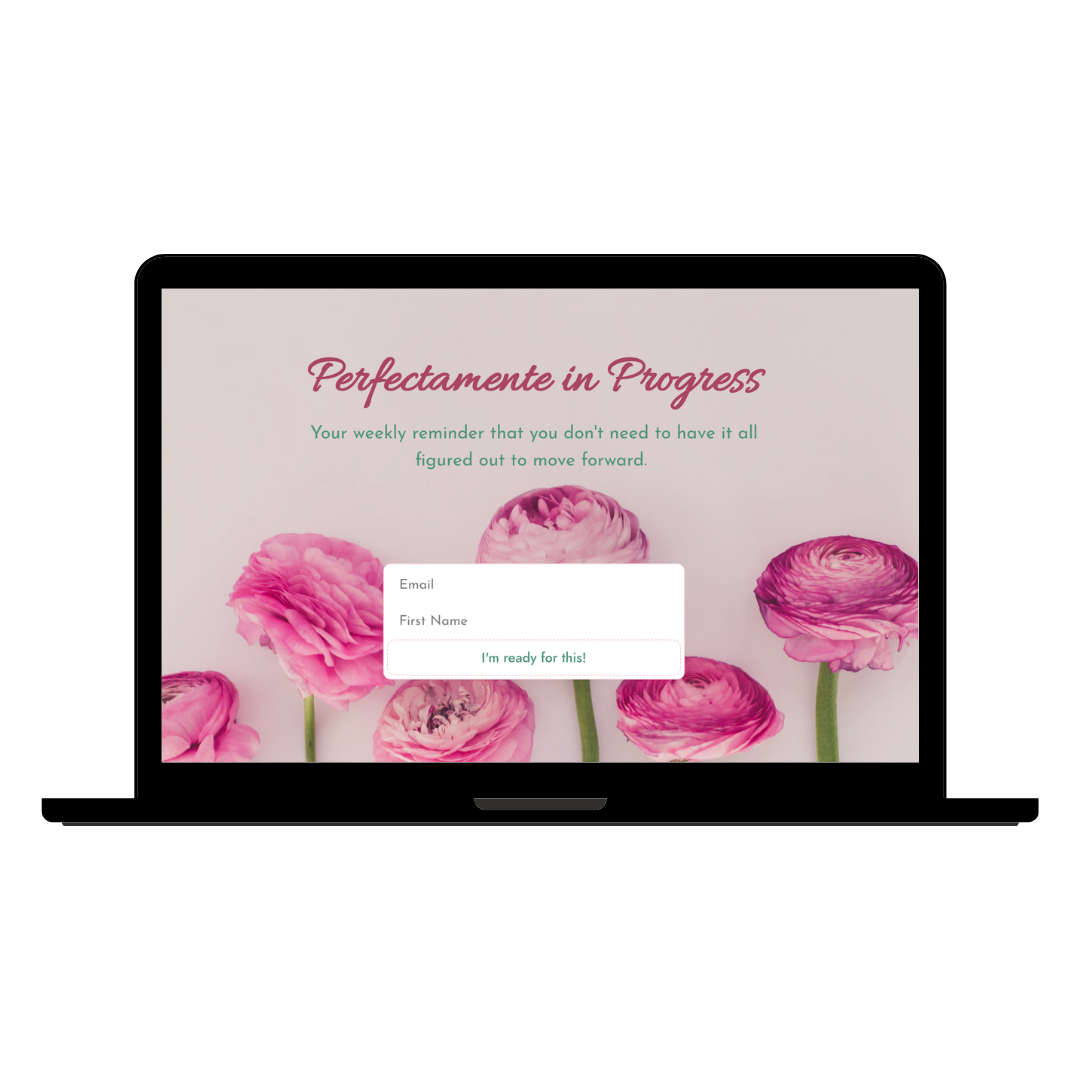How to Show Up Authentically When You’re Struggling
You know that moment when someone asks “How are you?” and you automatically say “I’m fine!” even though you’re barely holding it together? Or when you paste on a smile at work while dealing with something really difficult at home? We’ve all been there—caught between the desire to be genuine and the pressure to keep up appearances.
Being authentic when life is good feels relatively easy. But showing up as your real self when you’re struggling, scared, or going through something hard? That’s where authenticity gets complicated, especially if you’re used to being the “strong one” or if you work in environments where vulnerability feels risky.
Here’s what I’ve learned: authenticity during difficult times isn’t about oversharing or falling apart in public. It’s about finding ways to honor where you actually are without compromising your boundaries or professional relationships. It’s about being honest about your human experience while still protecting your energy and well-being.
Let me show you how to navigate this delicate balance—because the world needs your real self, especially when things get messy.
Why Authenticity Gets Harder When We’re Struggling
First, let’s acknowledge why being genuine during difficult times feels so much more challenging than usual.
Social expectations tell us to “stay positive” and “keep it together.” We’re often rewarded for appearing fine and penalized for showing struggle, especially in professional settings or family dynamics where we’re expected to be the reliable one.
Vulnerability feels risky when we’re already feeling fragile. When you’re going through something hard, the last thing you want is judgment, unsolicited advice, or people treating you differently because they know you’re struggling.
We lose touch with what we actually need. When we’re in survival mode, it’s hard to know what authentic expression even looks like. Do you need space? Support? To talk about it? To not talk about it? Sometimes we’re not sure ourselves.
Cultural and family messages about strength and resilience can make authentic struggle feel like failure. If you come from a family or culture that values “toughing it out,” admitting you’re having a hard time can feel like letting people down.
Professional pressures make authenticity feel like a luxury we can’t afford. If you’re one of the few people of color in your workplace, or if you’re in a competitive field, showing vulnerability might feel like it could damage your reputation or opportunities.
These aren’t just personal hang-ups—they’re real considerations that affect how safely we can show up authentically in different spaces.
The Authentic Struggle Spectrum
Here’s something important: authenticity doesn’t mean you have to share everything with everyone. It means being honest about where you are in ways that feel safe and appropriate for each relationship and context.
Think of it as a spectrum:
Level 1: Internal Authenticity
Being honest with yourself about what you’re experiencing, even if you’re not ready to share it with others yet.
Level 2: Selective Sharing
Choosing one or two safe people to be completely real with while maintaining appropriate boundaries with others.
Level 3: Contextual Honesty
Finding ways to be genuine in different settings without oversharing—like saying “I’m having a tough week” instead of “I’m fine” when you’re clearly not.
Level 4: Full Transparency
Sharing your struggle openly with people who’ve earned that level of trust and in spaces where it’s safe and appropriate.
You get to choose where on this spectrum feels right for each situation. Authenticity isn’t about radical transparency—it’s about not betraying yourself.
Practical Strategies for Authentic Struggling
Start with Baby Steps of Honesty
If you’re used to always saying you’re fine, sudden vulnerability can feel jarring for both you and others. Start small:
Replace “I’m fine” with more accurate alternatives:
- “I’m having a tough week, but I’m managing”
- “Things are pretty intense right now, but I’m getting through it”
- “I’ve been better, honestly, but I appreciate you asking”
- “It’s been a challenging time, but I’m taking it one day at a time”
Practice internal honesty first. Before you can be authentic with others, you need to be authentic with yourself. Check in regularly: How am I actually feeling right now? What do I need? What’s true for me today?
Choose one safe person to practice with. Pick someone who’s proven they can hold space for your struggles without trying to fix you or making it about them. Practice being more real with this person first.
Give Yourself Permission to Not Be “On”
That fake smile you wear when you’re struggling? It’s exhausting and disconnects you from your authentic experience.
It’s okay to show up differently when you’re going through something hard. You don’t owe anyone your usual energy level or emotional labor when you’re struggling. Sometimes authentic means saying “I’m not feeling very social today, but I’m glad to be here” instead of forcing cheerfulness you don’t feel.
Set gentle boundaries around your energy. “I’m dealing with some personal stuff right now, so I might be quieter than usual” gives people context without requiring you to share details.
Remember that people can usually tell anyway. That forced smile isn’t fooling anyone—it’s just creating distance between you and the people who might actually want to support you.
Navigate Professional Authenticity Carefully
Being authentic at work when you’re struggling requires extra nuance, especially if you’re in a competitive environment or feel like you can’t afford to show “weakness.”
Focus on impact rather than details. You can acknowledge that you’re going through something without sharing what it is: “I’m dealing with some personal challenges right now, so I might need a bit more flexibility with my schedule this week.”
Emphasize your commitment while acknowledging your reality. “I’m managing some health issues, but I’m committed to meeting our project deadlines. I might need to adjust how I work to make that happen.”
Use your support systems strategically. Maybe you can’t be fully authentic with your boss, but you can be real with a trusted colleague who understands your situation.
Know your rights. If you’re dealing with health issues, family emergencies, or other protected situations, research what accommodations you’re entitled to. Sometimes authenticity includes advocating for what you legally deserve.
Manage Family and Cultural Expectations
Families often have the strongest opinions about how we should handle struggles, especially if you come from a culture that values stoicism or if you’re typically the family problem-solver.
Communicate your needs clearly. “I’m going through something right now and need some space to process it” is a complete sentence. You don’t owe anyone the details of your struggle.
Set boundaries around advice-giving. “I appreciate that you want to help. Right now I need support more than solutions” can redirect well-meaning but unhelpful input.
Honor your cultural values while protecting your authenticity. Maybe your family believes in “keeping things private,” and you can respect that while still finding appropriate ways to get the support you need.
Remember that modeling authentic struggle can be a gift. When you show family members that it’s okay to not be okay, you give them permission to be human too.
Deal with the Discomfort of Others
When you show up authentically while struggling, some people won’t know how to handle it. They might try to fix you, minimize your experience, or become uncomfortable with your honesty.
Not everyone can hold space for your authenticity, and that’s not your fault. Some people are so uncomfortable with their own struggles that witnessing yours feels threatening.
You don’t have to manage other people’s discomfort with your honesty. If someone can’t handle you being real about having a hard time, that tells you something important about the relationship.
Prepare responses for common reactions:
- For the fixers: “I appreciate you wanting to help. Right now I just need you to listen.”
- For the minimizers: “I know others have it worse. This is still hard for me.”
- For the uncomfortable: “I understand this might be heavy. I’m not asking you to fix it.”
Find people who can witness your struggle without trying to change it. These are your people. Invest more energy in these relationships.
Creating Safe Spaces for Your Authentic Self
Build Your Support Network Intentionally
Identify your different types of support people:
- The listeners who let you process without trying to solve
- The distractors who help you take breaks from your struggles
- The practical supporters who help with concrete needs
- The wisdom-givers who offer perspective when you’re ready for it
Communicate what kind of support you need. “I need to vent for ten minutes and then I want to talk about something else” or “I’m looking for advice, not just validation” helps people support you better.
Don’t put all your authenticity eggs in one basket. Having multiple people you can be real with prevents you from overwhelming any one relationship.
Create Rituals for Authentic Check-Ins
Daily self-honesty practice: Ask yourself each morning: “How am I really doing today? What do I need to honor about my current state?”
Weekly authenticity audit: Reflect on where you were able to show up authentically and where you felt like you had to perform. What patterns do you notice?
Monthly support assessment: Evaluate whether you’re getting the emotional support you need and adjust your approach as needed.
Design Authentic Responses to Common Questions
Having prepared responses helps you stay authentic without feeling caught off guard:
“How are you?”
- “I’m having some ups and downs, but I’m managing”
- “Honestly? I’ve been better, but I’m taking it day by day”
- “It’s been a tough season, but I’m grateful for good friends like you”
“What’s wrong?”
- “I’m dealing with some personal stuff. I appreciate you noticing”
- “I’m going through something challenging right now. Thanks for asking”
- “Things are hard right now, but I’m getting the support I need”
“How can I help?”
- “Just knowing you care helps a lot”
- “Actually, [specific request] would be really helpful”
- “I’m not sure yet, but I’ll let you know if something comes up”
The Gifts of Authentic Struggling
When you learn to show up authentically while going through hard times, beautiful things happen:
You discover who your real friends are. The people who can handle your humanity are the ones worth investing in long-term.
You give others permission to be human. Your authenticity creates space for others to drop their masks too.
You build genuine resilience. Pretending to be fine when you’re not actually makes you more fragile. Authenticity builds real strength.
You develop deeper self-trust. When you honor your actual experience instead of performing wellness, you learn to trust your own perceptions and needs.
You create more meaningful connections. Relationships built on authenticity are more satisfying and supportive than those built on performance.
Your Authenticity Practice Starts Here
This week, I challenge you to experiment with one small step toward more authentic struggling:
Choose one relationship where you could be a little more honest about how you’re really doing.
Pick one automatic response (“I’m fine,” “Everything’s great”) and practice replacing it with something more accurate.
Identify one way you’re currently performing wellness when you could just be human instead.
Notice where you feel safe to be authentic and where you don’t. There’s wisdom in both observations.
Remember: authenticity during difficult times isn’t about becoming an open book with everyone. It’s about honoring your actual experience and finding safe, appropriate ways to show up as your real self.
You don’t have to be fine to be worthy of love and belonging. In fact, your willingness to be human—messy, struggling, imperfect, and real—is exactly what makes you worthy of deep connection.
The world doesn’t need another person pretending everything is perfect. It needs your genuine, beautifully imperfect, authentically human self.
Remember: Your authenticity—including your struggles—is a gift to the world. Don’t rob us of your humanity by pretending to be perfect.
Subscribe to the Newsletter








